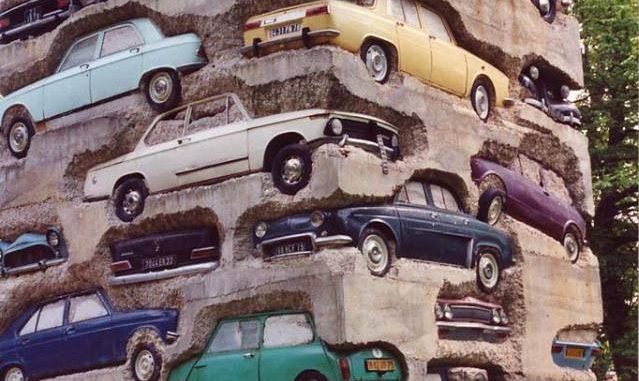
The Turning Point School is close to both the Culver City Expo Line Station and some of the the tightest daily traffic jams on the Westside; that made it an ideal venue for Dr. Donald Shoup to talk about parking problems. But Shoup, a Distinguished Research Professor at UCLA and noted author of two books on the topic, was not complaining about the lack of available spaces.
Shoup’s research is focused on how planning our environment around parking creates multiple problems. When housing and transportation are held hostage to parking, cars are held above people in importance. Starting with the premise that “all parking is political,” he noted that parking takes up an astonishing amount of pubic space – about 14 % of urban Los Angeles – and that people driving around looking for parking contribute to greenhouse gases.
The real cost of ‘free’ parking is obnoxious. “We have a new parking garage at UCLA, and each individual parking space is costing the university $84,000. That is what ‘free parking’ costs in terms of real estate, architecture, and concrete.” This cost is passed on to students, faculty, and Westwood Village in other ways, with the factors reverberating in high rents, housing shortages and more traffic.
Focusing on the single family suburban home, Shoup stated that “the street-facing garage is the single biggest change in architecture in 500 years,” and illustrated how converting garages to apartments – legally – could significantly ease traffic by allowing more people to live closer to work.
Shoup was able to offer an example of how changing parking policy can create successful civic space by reflecting on Old Pasadena as dedicated parking district. It had been a ‘commercial skid row’ with stores and buildings from the 20th Century neglected and underused. The City of Pasadena installed parking meters and used the money generated to clean up and beautify the area; Old Pasadena is now a shopping and dining destination for all of Southern California. Because the parking was no longer free and the income from the meters was dedicated to being used only for that area.
The concept of dynamic parking pricing – charging more for hours and streets in higher demand – was also supported by evidence from a number of cites that have adopted the practice. (See video on SF Parking below.)
Shoup punctuated his talk with jokes, cartoons and wit, keeping what might be a very flat topic engaging and compelling. His demand as a public speaker is no surprise to any of his audiences, and the occasional laugh does a lot to help the brain process and retain information. His closing image of the French sculpture “Long Term Parking” (see above) was just one of many that drew laughter from the crowd.
While the Culver City Council looks towards updating the General Plan, Shoup’s perspective on parking is one that may help to shape significant shifts in future policy decisions. ‘Free Parking’ isn’t really free.
Judith Martin-Straw


Be the first to comment